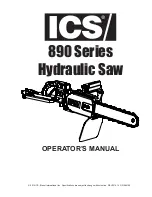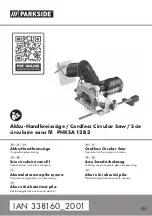
21
O R I G I N A L I N S T R U C T I O N S
GB
extraction system. If the supplied bag is used, it should be
fi
xed to the spigot (XV). The bag should be emptied each time it is full
and each time after work is
fi
nished.
When using an external dust extraction system, e.g. in the form of an industrial vacuum cleaner, the
fl
exible vacuum cleaner hose
should be connected directly or with a suitable adapter to the saw spigot. The saw is not equipped with an adapter for connecting
the hose.
Transporting the product
Transporting the mitre saw must be done in its original factory packaging. Lower the cutting head to the lowest position and secure
with the pin. Turn the table by 45 degrees, in accordance with the arrangement of the polystyrene mouldings in the packaging.
Remove the work table locking screw.
If the saw is to be moved over short distances, e.g. to change the workstation, the saw must
fi
rst be secured by lowering and
locking the head, securing the movement of the horizontal cutter guide and the rotation of the head in both cutting planes. Always
transport the mitre saw disconnected from the power supply. The power cord must be unplugged from the socket.
If the saw is equipped with a transport handle, use it to carry the tool over short distances. Before using the handle, make sure
that the head has been secured in its lower position and its movement along the guides and position in both cutting planes has
been locked.
Laser pointer
The saw has a laser pointer, which shows the cutting line on the workpiece attached to the table. The pointer is activated with an
independent switch. Position: O - indicates that the pointer is o
ff
, position: I - indicates that the pointer is on. Do not look at the
laser beam emission source, as it may cause temporary or permanent damage to eyesight.
Rotation speed adjustment (XXIII)
The mitre saw has a switch for changing the rotation speed of the disc. Select the rotation speed depending on the workpiece.
When cutting wood and wood-based materials, set the switch to position II - higher rotation speed. In case of metal cutting, set
the switch to position I - lower rotation speed.
Caution! Before starting to cut, make sure that the correct rotation speed has been set for the selected workpiece.
Cutting wood at a lower rotation speed results in lower performance and a less even cut edge. Cutting metal at a higher rotation
speed results in overheating the circular saw and the cutting edge. This will lead to a faster wear of the saw and a higher load on
the drive gear, and can also lead to damage to the circular saw and the mitre saw.
Activation of the mitre saw
The on/o
ff
switch has a safety lock to prevent unintentional pressing. Before pressing the on/o
ff
switch, move the lock button until
it is
fl
ush with the switch surface, and then press the on/o
ff
switch while holding the lock button.
Cutting with the mitre saw
There are three types of sawing possible. Cutting while the head is moving down or cutting while the lowered and locked head
moves horizontally. The third type is the plunge cutting, where the head is lowered to a pre-set height, held in this position and
then moved horizontally.
Full lifting of the head will trigger an additional lock to prevent unintentional lowering of the head. The head can only be lowered
after pulling the lock away (XVI).
Move the head and secure it by tightening the guide lock screw (XVII). Adjust the angles of the head and make a simulated cut
without connecting the saw to the power supply. Check that the circular saw does not come into contact with the table, retaining
plate or any other part other than the workpiece.
When cutting with the lowered head moving along the guides, lower the head and secure it with the locking pin. Unlock the guides
by loosening the locking screw. Adjust the angles of the head and make a simulated cut without connecting the saw to the power
supply. Check that the circular saw does not come into contact with the table, retaining plate or any other part other than the
workpiece. Check that the movement on the guides is smooth.
If the head is set at a certain height, loosen the
fi
xing screw of the head-lowering limiter, move it and lock it in this position by
tightening the screw (XVIII). Then adjust the lowering height of the head by screwing in the screw and lock it with the ring (XIX).
Adjust the angles of the head and make a simulated cut without connecting the saw to the power supply. Check that the circular
saw does not come into contact with the table, retaining plate or any other part other than the workpiece. Check that the movement
on the guides is smooth.
Fix the workpiece to the table so that it always rests against the retaining plate. Use the supplied clamp to
fi
x the workpiece.
Fasten the clamp pin on one side of the table. Secure the pin by tightening the screw (XX). Adjust the height of the clamp arm and
secure it by tightening the screw (XXI). Place the workpiece on the table and
fi
x it by tightening the clamping disc (XXII).
After pressing the switch, allow the circular saw to reach the rated speed and only then start cutting. The switch does not have
a lock to secure it in any position. It is forbidden to
fi
rst apply the saw to the workpiece and then start the tool. This can jam or
















































